2014 continues to be a good year for Archives donations. One the newest acquisitions brought 26 letters written by Dean Rusk, class of 1931, to Dr. Guy R. Vowles. The letters, written between 1931 and 1942, provide insights into Rusk’s experience as a Rhodes Scholar and his early career.
Dr. Guy R. Vowles came to Davidson in 1925 and remained for another 28 years teaching German. His education included being a Rhodes Scholar and earning both a bachelors and a masters degree from Oxford. His son Richard B. Vowles graduated from Davidson in 1938. Vowles retired in 1953 and died a decade later in 1963.
Dean Rusk’s first letter is dated July 6th, 1931 and is written while visiting his parents in Georgia. He reports that he has a “little job with the Georgia House of Representatives” in August but hopes to be in Davidson for a week in September. He also provides a testament to Vowles’ support and interest:
I feel that you know without my trying to say it, how deeply I appreciate the fine things that you and Mrs. Vowles have done for me. I suppose that the most eloquent way for me to say thanks would be by making good on the chance that you had such a large part in giving me. If I am not presuming too much, I would like to keep in touch with you, for I know that you could help me, and I might be able to lend some suggestions for future applicants from Davidson.
The next letter is written as Rusk is sailing to England to begin his studies as a Rhodes Scholar.
His thoughts are still on Davidson and he offers advice for future Rhodes Scholar applicants:
I hope very much that a Davidson man will come over next year. You know a great deal more about it than I do, but from my experience with the district committee I’d like to emphasize suggestions that you have probably already made. First, does the man have a definite plan in mind for the future in which a Rhodes Scholarship is a vital part, and second, what has he already done toward making out a plan beyond required school work – in the way of outside reading or student and things like that.
Interestingly, the letters begin to reveal how much Rusk’s plans change as he goes through his studies. Initial hopes for reading directly for a D. Phil degree in Politics resolved into reading for a B.A. honors school exam as a more practical course.
Rusk’s letters show his ongoing interest in Davidson College and also his political awareness. They also occasionally provide a bit of local color:
Last night was Guy Fawkes night and the 4000 Oxonians turned out in a body into Cornmarket Street between High and the Martyr’s Memorial and had a very gay time. I was in it for about two hours, but not having strengthened by spirits from the ale and beer barrels, soon had enough of it and came in for some reading. Firecrackers were everywhere, I was lucky to come back with both eyes in good condition. The Bobbies had a hard time keeping their helmets. Someone put a tin pot on top of the Martyr’s Memorial. Usually it’s a porcelain one and they shoot it down, but the tin one held its place in spite of the fusillade. The fire wagon with a hard stream of water turned the trick. The proctors were reinforced with extra bulldogs for the occasion.
Rusk claimed no homesickness on Christmas eve as he was too busy keeping up with Davidson friends and studying Ethics, reporting “Ethics is the tune I’m singing from early morning till well into the night.” He also takes a few paragraphs to keep Vowles abreast of crew races and his efforts to keep up with his German language skills (which include at one point a “very attractive, with big Blue German eyes and very blonde “tutor though he claimed that his interest was purely linguistic.)
More chilling are his observations on German politics in1933:
Easter vacation will probably be spent in Germany again. The accession of Hitler to power, my own desire to improve my German, and the necessity of getting out of England for a bit, have convinced me that Hamburg or Berlin is the place for me Easter. It is doubtful if many of us realize how important the present happenings in Germany are to the whole bunch of us. When we realize that German Communists add about a half million to their poll at every election, and that a party which believes in considerable violence has succeeded in setting its leader in the chancellorship, we must begin to realize what might happen in that strife-ridden country.
In 1935, Rusk reports on his work with a special institute at Mills College. Rusk notes that he dislikes taking time from his studies but that he believes:
the subject matter of the Institute needs constant and critical study. It seems to me that we have been asking the wrong questions too much. We spend a lot of time convincing each other that we do not want war because war costs too much — and then we start talking about peace without asking what peace is going to cost. And then we are pained when an occasional bill is presented, and sometimes are so surprised that we drift into war merely because we don’t know what else to do.
Some recent Davidson graduates may find comfort in Rusk’s uncertainty rive years out of Davidson and in his first teaching position:
The job here is getting very interesting, filling out with possibilities, friends, influences, outside interests, etc. all the time. I have still not tried to decide whether to stay here or not. There is still the lurking suspicion that this is not just the time to decide a major problem of vocation –or do you think that all periods of our own lifetime have been of the same sort?
In the last letters in the collection, Rusk finds himself in the army. In the September 1941 letter he reports new orders sending him to the War Department General Staff in Washington, DC and expressing hopes of renewing friendships, particularly if “language meetings, or other tasks” would bring Vowles to Washington.
Although the correspondence ends in 1942, the arrival of this letters back to Davidson add to the history of faculty-student relationships and of Davidsonians in the world. The letters are open to researchers and we look forward to sharing them with current Davidsonians.
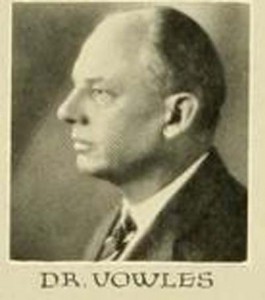
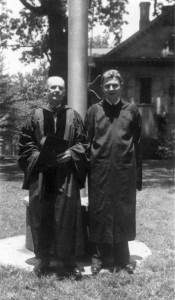
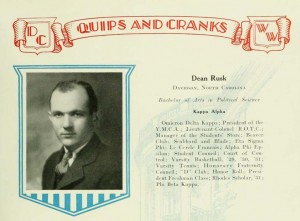
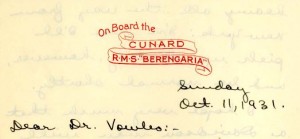


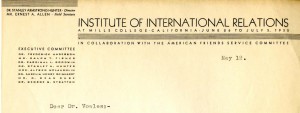
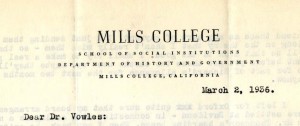
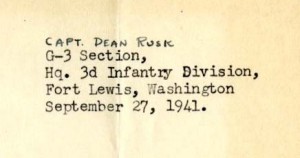

Speak Your Mind